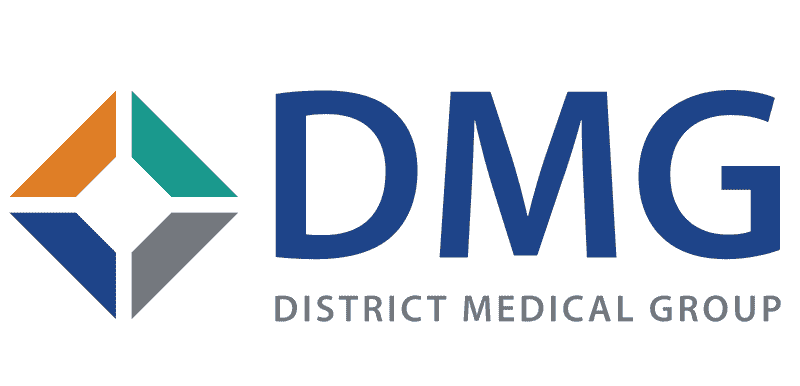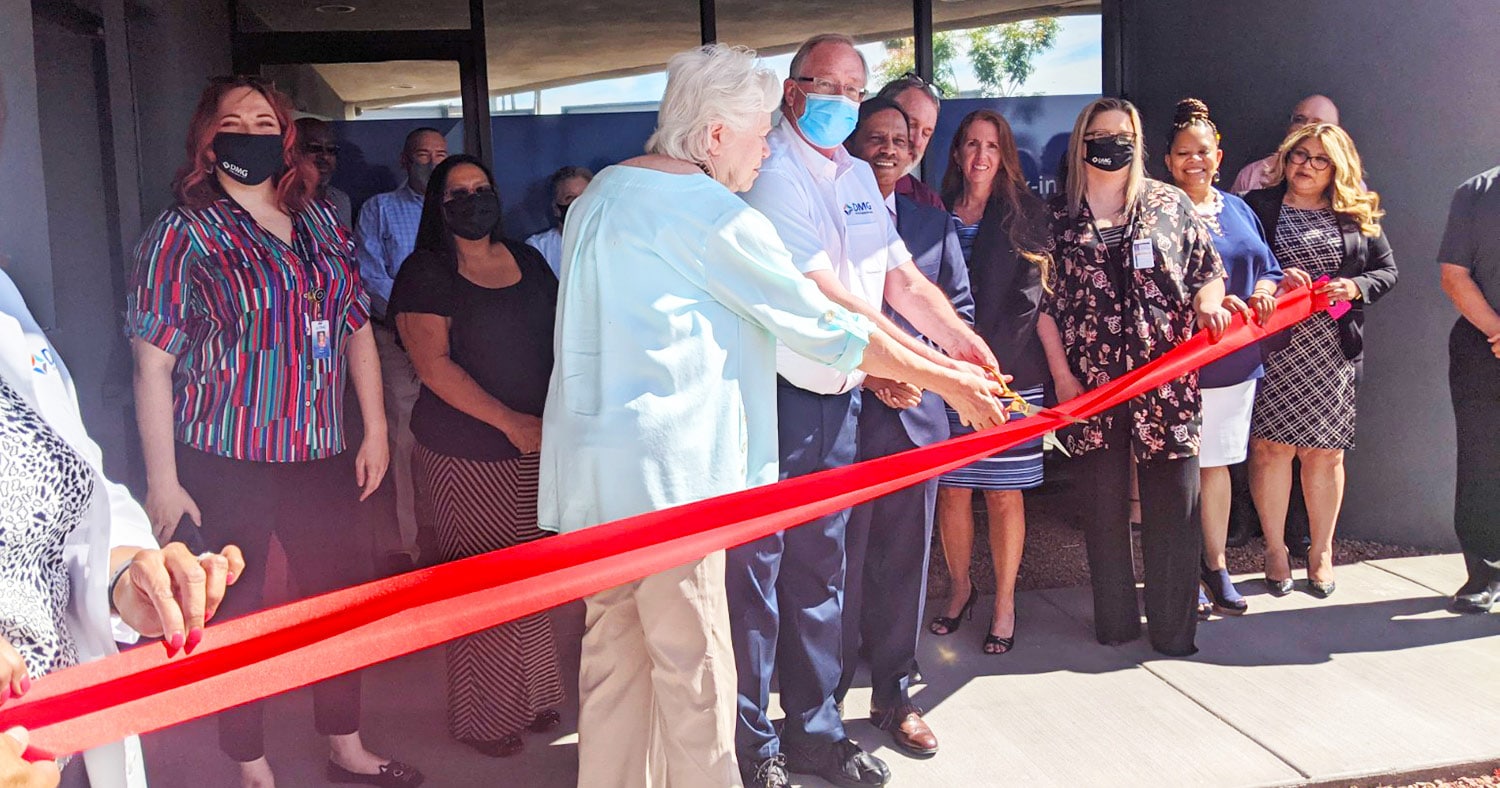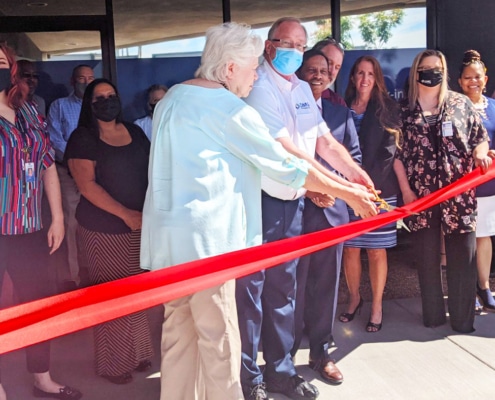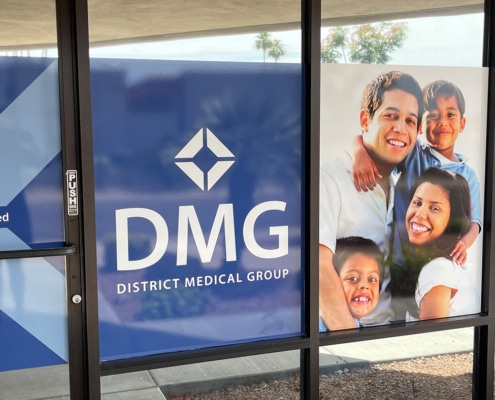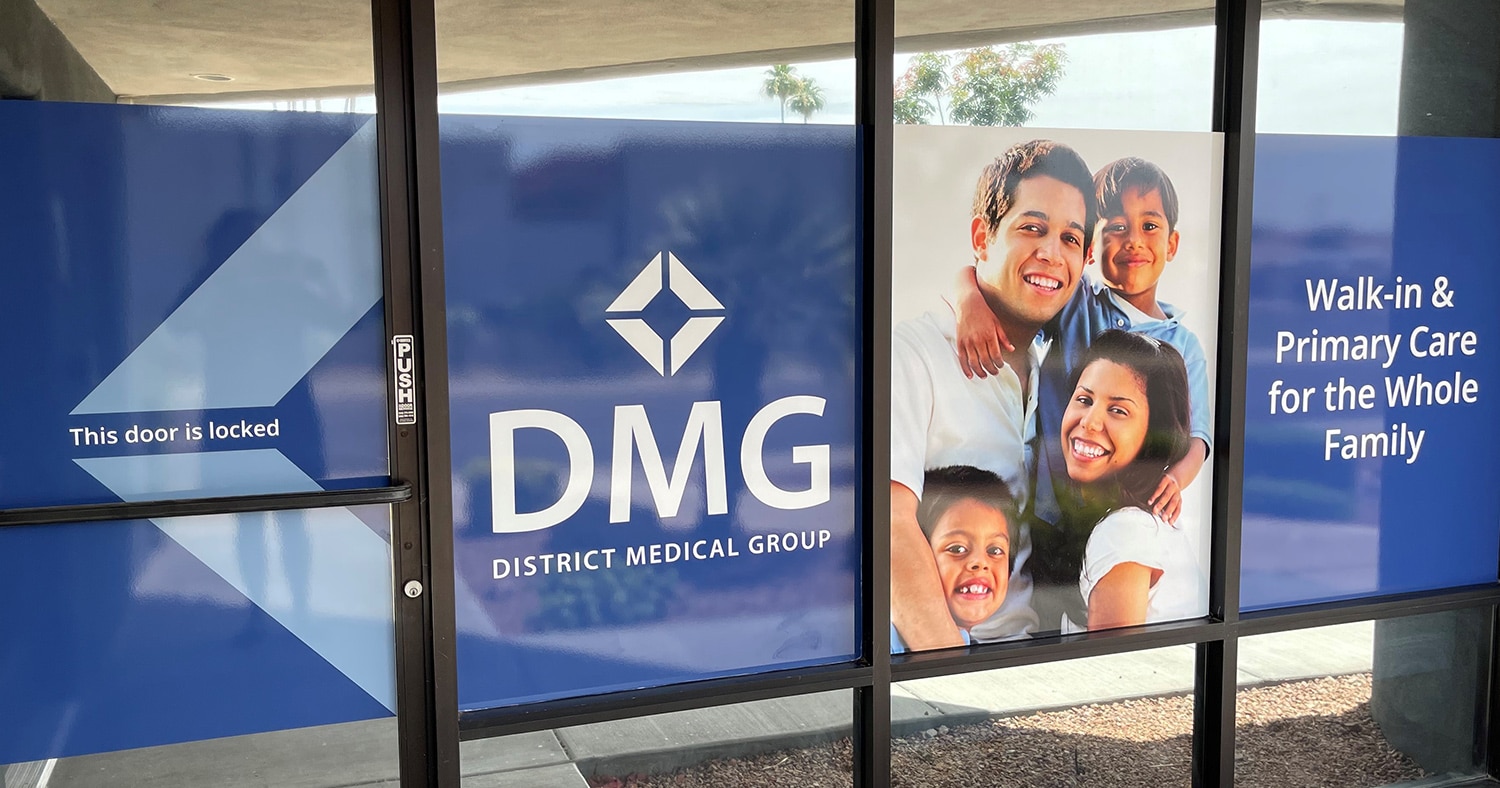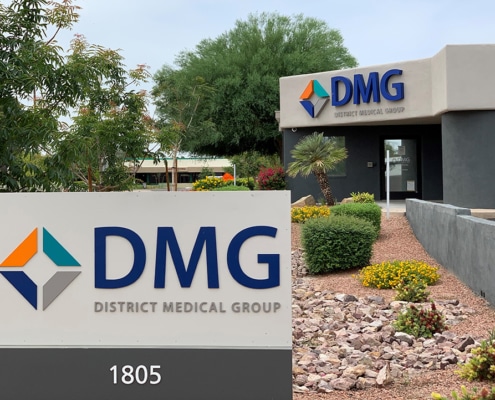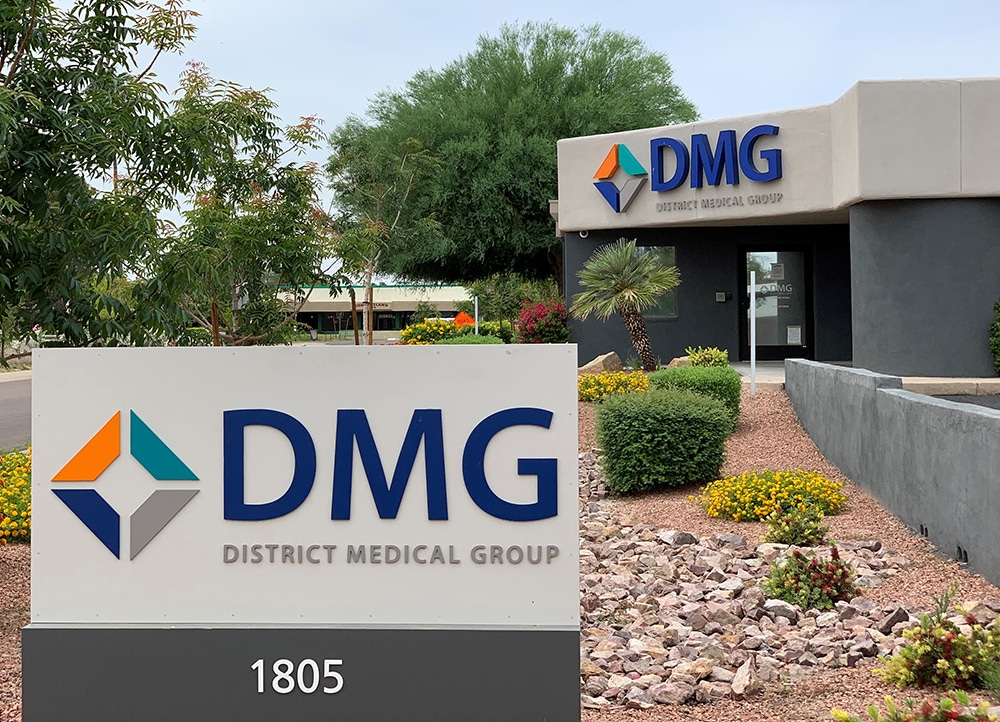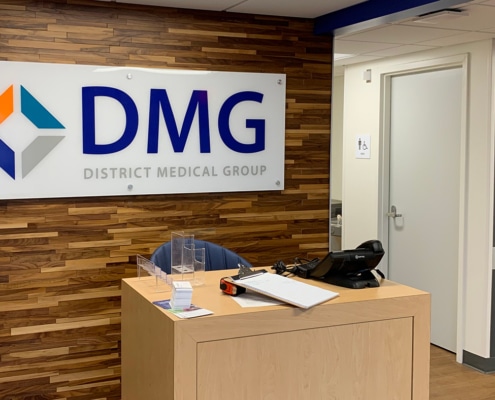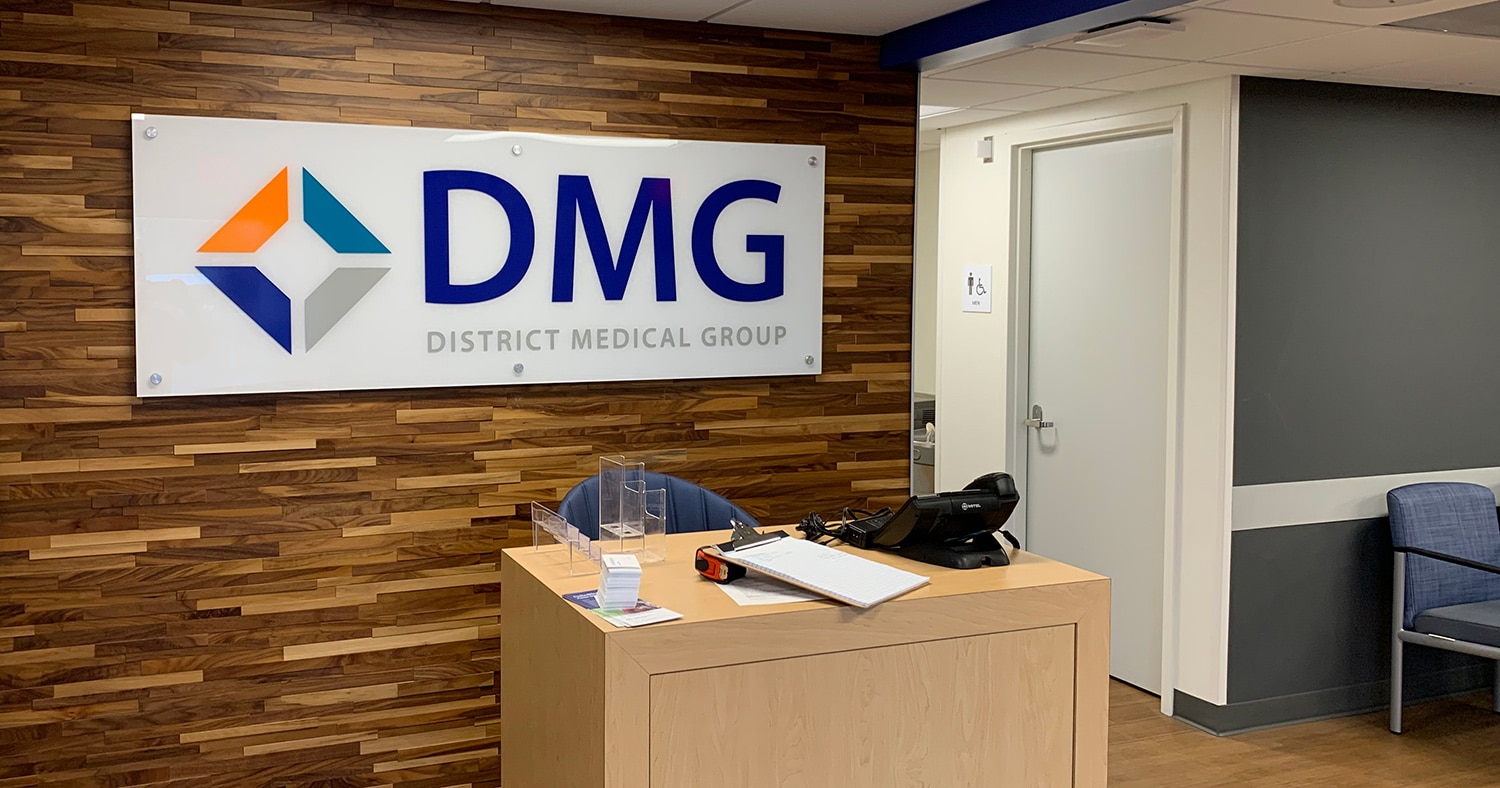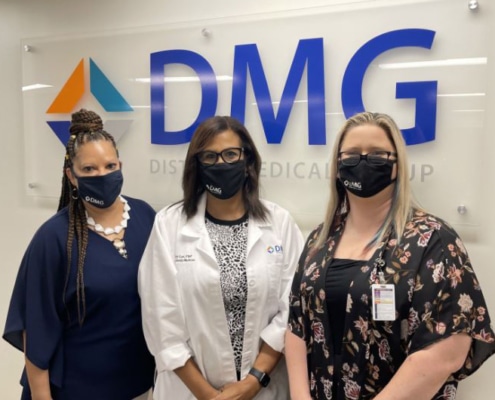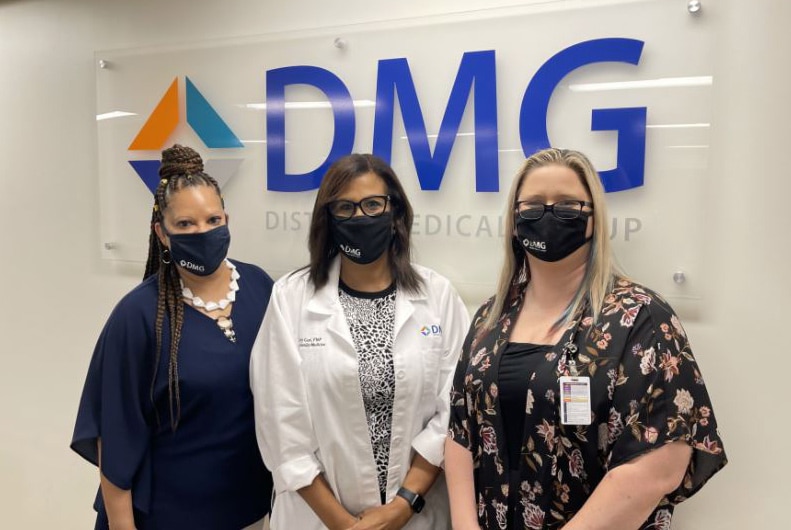District Medical Group Opens Primary Care Clinic to Serve Scottsdale and Tempe Residents and Visitors
/ District Medical Group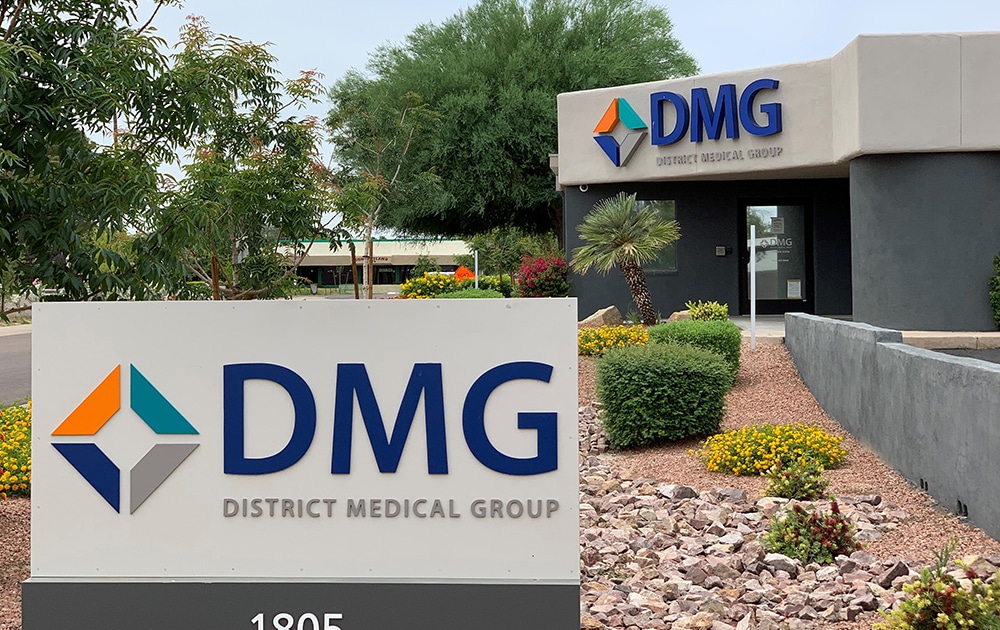
DMG Papago Family Practice offers walk-in and same day care to patients of all ages
PHOENIX () — District Medical Group (DMG), a Phoenix-based non-profit medical group comprised of more than 650 providers across more than 25 medical specialties, has opened a primary care clinic at 1805 N. Scottsdale Road on the Scottsdale-Tempe border, conveniently located north of the 202 highway off the Rural Road exit. Called DMG Papago Family Practice, the location serves patients of all ages offering preventive medical care as well as acute care for common illnesses and minor injuries.
”We are thrilled to expand our footprint to serve residents and visitors of Scottsdale and Tempe by providing primary care services by appointment as well as walk-in care,” said Kote Chundu, MD, President and Chief Executive Officer of DMG. “Our goal is to continue to grow and offer quality, accessible medical care to patients of all ages close to home. This clinic provides us the opportunity to bring medical services to a community that needs additional primary care providers.”
The location was formerly a primary care clinic run by UnitedHealthcare (UHC), which closed in October 2019. Recognizing the need for primary care providers to serve this diverse area, which includes established residential neighborhoods, newly constructed and existing apartment complexes, employers, hotels, Skysong Innovations, and Arizona State University, DMG stepped in to fill the gap and support the community.
The DMG Papago Clinic is open Monday-Friday, 7:30am-5:30pm. Appointments can be scheduled by calling (602) 470-5550; walk-in care is also available. Medical services offered include but are not limited to:
- Care for minor injuries
- Immunizations
- School and sports physicals
- Treatment of common illnesses, such as cold, flu and allergy symptoms
- Wellness exams, including well-child medical exams
For more information, visit dmgaz.org/papago-family-practice/ or call (602) 470-5550.
About District Medical Group
District Medical Group (DMG) is a nonprofit entity made up of more than 650 providers across all major medical and surgical specialties. The largest independent integrated medical group in the Phoenix metropolitan area, DMG staffs three psychiatric hospitals, a 450-bed acute care hospital, two emergency care centers, 13 community health centers, four primary care clinics, a nationally-recognized burn center, and the largest Multi-Specialty Interdisciplinary Clinic (MSIC) for children in Arizona. In addition, DMG collaborates with community organizations and schools to provide primary care and other programs. With more than 220 residents in nine programs and 60 in affiliated programs, DMG is the largest teaching faculty in Phoenix. DMG is one of the founding partners of the Creighton University Arizona Health Education Alliance, designed to develop new healthcare programs and increase the number of medical providers across specialties in Arizona. For more information, visit DMGAZ.org.
Media Contact
District Medical Group
Toni J. Eberhardt
C: (602) 418-7767
toni_eberhardt@dmgaz.org
A New Endowed Chair in Medicine for Phoenix Campus
/ Sam LeeDr. Wisinger was installed as the holder of Creighton’s 44th endowed chair and first on the Phoenix campus on Wednesday, June 9.
COVID-19 Vaccine Education
/ District Medical GroupDr. Frank LoVecchio answers AZ Family viewers’ top questions about the COVID-19 vaccine during their “National Day of Action” in an effort to get more people vaccinated.
DMG Papago Family Practice Gets Ready to Open with Ribbon Cutting
/ District Medical GroupOn Tuesday, June 8, District Medical Group (DMG) leaders, Board members, providers and staff gathered at the newest DMG primary care clinic, DMG Papago Family Practice.
Opening on June 14, this location will serve patients of all ages offering appointments, including same day, as well as walk-in care.
DMG president and CEO, Kote Chundu, MD shared his excitement for the opening of this clinic, which will provide much needed primary care to the currently underserved community on the Scottsdale/Tempe border.
DMG Board of Directors chairman and vice-chair, Dan Hobohm, MD, and Phyllis Biedess respectively, echoed Dr. Chundu’s appreciation for the efforts of DMG team members across multiple departments to prepare this location to open. Board member Alan Rawls also attended to support DMG’s newest location.
DMG Papago Family Practice was formerly a United Healthcare (UHC) primary care location which had closed, and the two organizations worked together for more than a year to transition the clinic to DMG.
United Healthcare Community Plan of Arizona CEO, Jean Kalbacher, was on-hand at the ribbon cutting and shared her gratitude for the successful collaboration between the two organizations to ensure residents in the Papago area were not without a community primary care provider for too long.
Why Men Need to Get Annual Wellness Exams and Why They Don’t
/ District Medical GroupBy Misty Cox, FNP-C, WHNP, family nurse practitioner

Contents:
According to a study by the Cleveland Clinic, nearly 60 percent of men do not regularly see a doctor for preventive care; instead, these men only seek a medical specialist when they are seriously ill. Of those surveyed, three in five men get annual physicals. When asked what they regularly talk about, only seven percent said their health.
Did you know men die an average of five years sooner than women? Perhaps the fact that, according to the Centers for Disease Control and Prevention (CDC), women are 33 percent more likely than men to see a medical provider is one reason why.
June is Men’s Health Month so let’s get to the bottom of why men are less likely to seek preventive care, how you can help the men in your life, and what men’s health screenings are recommended.
Why are men less likely to seek medical care?
An online survey commissioned by Orlando Health revealed the following reasons men do not seek medical care, with the first two being the most reported:
- Too busy
- Afraid of what medical condition might be discovered
- Not “sick enough”
- Discomfort of the exam (i.e., prostate checks, testicular exams, colon cancer screenings, etc.)
A survey by Cleveland Clinic revealed that 19 percent of men will seek medical care to get their significant other or a loved one to “stop nagging them” about it.
What screenings should men get and when?
Depending on age, family medical history, lifestyle, and more, a primary care provider (PCP) will recommend the following screenings and potentially other tests to support the health of a male patient.
Blood pressure screening
Regular blood pressure screening enables early detection of pre-hypertension and/or high blood pressure, a leading cause of heart issues and stroke.
Cholesterol level test
Men need regular cholesterol testing at age 35; those with a higher risk factor should begin testing as early as age 20. Like blood pressure issues, high cholesterol can lead to heart attacks and/or stroke if not detected early and managed through diet, exercise, and/or medication.
Colorectal exam
Both men and women should begin colorectal screenings at age 50. Based on family history and other risks, a PCP may recommend these screenings begin earlier.
Diabetes screening
Starting at age 45, healthy men should begin diabetes screenings every three years. Testing may begin earlier for those with higher risk factors, including high cholesterol or blood pressure.
Glaucoma test
Eye tests for glaucoma are based on age and personal risk. Generally, men should be tested as follows:
- Under the age of 40: Every two to four years
- Age 40-64: Every one to three years
- Age 65+ Every six to 12 months
Prostate exam
Prostate cancer is second only to skin cancer as the most common form of cancer in American men. The American Cancer Society recommends men discuss prostate cancer screening with their PCP to make an informed decision. Prostate cancer screening may be recommended as follows:
- Age 50 for men at average risk with a life expectancy of >10 years
- Age 45 for men at high risk, including African Americans and men who have a father or brother diagnosed with prostate cancer under the age of 65
- Age 40 for men at higher risk due to having more than one first degree relative (i.e., father, brothers) who had prostate cancer at an early age
Skin cancer screening
Skin cancer is one of the top cancers found in men. Annual screenings are recommended and may be increased in frequency if skin cancer or pre-cancerous cells are found.
Testicular cancer exam
Most testicular cancers can be detected early, so a testicular exam should be part of a man’s annual health screening.
